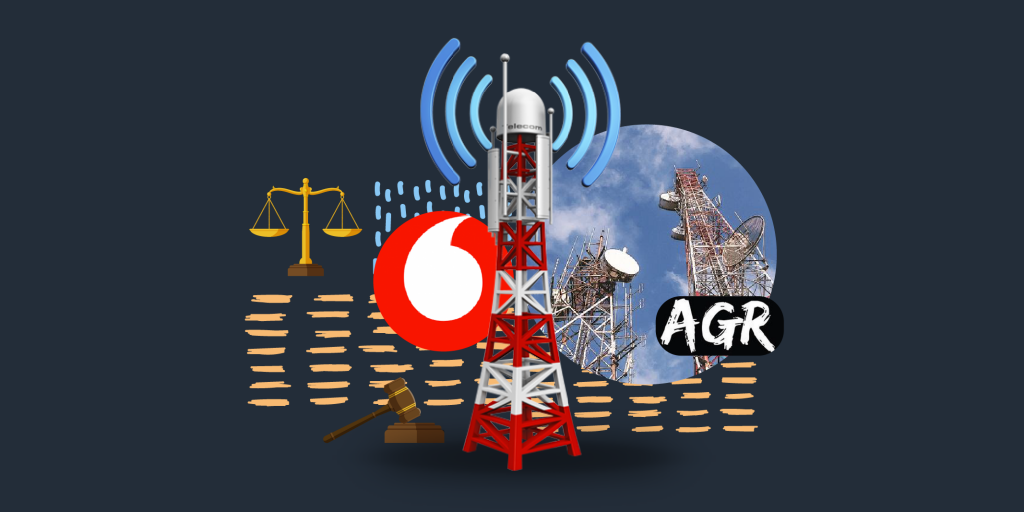Last Updated on Sep 8, 2020 by Aradhana Gotur
On 1st Sep 2020, the Supreme Court finally passed a verdict on the long-pending AGR case. The case was regarding the payment of deferred license fees and spectrum charges by the telecom operators to the Department of Telecommunications (DoT). The verdict that SC passed in 2019 had left major telecom operators such as Vodafone Idea and Bharti Airtel with a massive debt overnight. It was almost like a riches-to-rags scene.
So, how did it come to this? We’ll cover that, SC’s AGR verdict, the current situation of the telecom operators, and how they are preparing to pay the dues within the timeline set by the apex court in this article.
The article covers:
Indian telecom sector: public + private
Rewind: what exactly is the AGR dues case?
Two definitions of adjusted gross revenue
Latest adjusted gross revenue verdict by the Supreme Court
What happens in case of non-payment of AGR dues?
Why did the SC extend the timeline?
Where does Reliance Jio stand?
Where do Vodafone and Airtel stand now?
How is Vodafone preparing for this?
Table of Contents
Indian telecom sector: public + private
The Indian telecom sector is not a crowded place. First, we have BSNL and MTNL—both run by the government and crippled due to internal issues. But since these are PSUs, the government won’t shut them. They’ll do what they can to revive them. And so, last year, a proposal was made to merge BSNL and MTNL. And, the Union Budget 2020 proposed to pump in some funds in the ailing public telecom operators. That’s about the government telecom operators. What about the private sector?
Well, in the private segment, we have Reliance Jio, Bharti Airtel, and Vodafone Idea dominating the space. So, they pretty much compete among themselves and were going on about their business as usual until tables turned on 24th Oct 2019.
Rewind: what exactly is the AGR dues case?
In 2005, Indian telecom players had filed a petition to pay their adjusted gross revenue (AGR) dues as per their definition over that of the Department of Telecommunications. After a long gap of 14 yrs, on 24th Oct 2019, the Supreme Court (SC) passed the AGR verdict saying the telecom players were to pay their AGR dues as defined by the Department of Telecommunications (DoT). This AGR verdict left Vodafone Idea and Bharti Airtel with a massive debt overnight (Jio too, but the situation was not intense).
What is AGR?
Telecom operators pay spectrum charges and license fees to the DoT for using spectrum owned by the government. They used to pay this based on the ‘fixed license fee’ model but then migrated to ‘revenue-sharing fee’ in 1999. Now, AGR is a system that defines how the adjusted gross revenue earned by the telecom operators is shared between the government and themselves.
Two definitions of adjusted gross revenue
The problem here is that there were 2 definitions of AGR. As per the DoT, the revenue, whose percentage is to be paid to the government, should include both telecom and non-telecom sources of a telecom company. However, the telcos have a different version that defines AGR as only revenue earned from telecom services.
What is the AGR issue?
Paying AGR as per the telecom operator’s definition would save their costs. After a long legal tussle of 14 yrs, the SC upheld the DoT’s definition to pay AGR. The SC ruling meant that the telcos had to pay more than just the AGR dues. On top of it, they also had to pay penalty and the interest on penalty incurred due to the delay. What’s more, the timeline given by the SC to pay the dues was just 3 mth, that is, by 23rd Jan 2020. With lakhs of crores of debt added to their liabilities and little time to pay it, telcos were undoubtedly in a soup.
Latest adjusted gross revenue verdict by the Supreme Court
The recent AGR verdict given by the SC says:
- The telecom firms are to pay their AGR dues to the DoT over the next 10 yrs. Earlier, the DoT had suggested the timeline to be 20 yrs
- The telecom players are to pay 10% of their total AGR dues by 31st Mar 2021 owing to the pandemic
- Subsequent to this, the telecom operators can pay the AGR dues in annual instalments from 2021 and 2031. These annual instalments are to be paid at 8% interest on or before 7th Feb of each year
- The managing directors of these telecom players are required to deposit a personal guarantee within 4 weeks from the date of the ruling
What happens in case of non-payment of AGR dues?
In any year, if the telecom players fail to pay their annual instalment of dues, they would incur interest that accrues and also attract court proceedings against themselves.
Why did the SC extend the timeline?
Paying a massive debt in a short span of time would clearly mean the end for telecom players. Vodafone Idea put it out that payment of its AGR dues shortly meant it would have to file for bankruptcy. This could, in turn, impact millions of subscribers, who would request to port their services with the surviving operators.
It meant no good news for the surviving operators either as they would find it difficult to maintain service quality while handling a steep surge of portability requests. Besides, the SC had already rejected the telecom operators request to reduce the dues. Finally, the apex court settled with the DoT and the telcos request to consider a revised payment timeline at least.
Where does Reliance Jio stand?
Well, we know Reliance Jio. It’s like the best-performer kid in school. So, Reliance Jio was the only telecom operator to clear the AGR dues within 23rd Jan 2020, the original deadline given by SC. And why not, Jio had only incurred dues of Rs 195 cr till 31st Jan 2020.
Where do Vodafone and Airtel stand now?
When the SC upheld DoT’s definition of adjusted gross revenue, Bharti Airtel was slapped with dues of Rs 36,000 cr. Over time, Airtel has paid ~40% of its AGR dues, which leaves it with Rs 21,600 more. Vodafone Idea, on the other hand, incurred dues of over Rs 58,000 cr. So far, the ailing telco has only paid 13.53% of the dues.
How is Vodafone preparing for this?
Clearly, Vodafone is in bad shape. Ergo, to beef up the funds required to pay its dues, the telco is set to raise up to Rs 25,000 cr via:
- Equity issued to the public, preferential allotment, qualified institutional placement (QIP) or private placement OR
- Non-convertible debentures (NCDs)
Vodafone Idea is yet to present the proposal at its annual general meeting on 30th Sep 2020. In addition, Verizon Communications and Amazon.com Inc of the US have also shown interest in resuming discussions of acquiring a significant stake in Vodafone Idea. That would be another ray of hope for the ailing company.
But these funds would not support the telco adequately. Mainly because the question here is about paying the deferred AGR dues, annual adjusted gross revenue charges, funding regular operations, and meeting capital expenditure simultaneously.
At the current arpu or average revenue per unit that Vodafone earns, it is impossible to meet all the obligations. Notably, Vodafone Idea’s arpu was Rs 121 in Q4 FY2020 but fell to Rs 114 in Q1 FY2021. That is why, telecom experts opine that Vodafone Idea would need additional support in terms of:
- Fresh equity
- Higher tariff or more than double its arpu
- Concession in government levies
What about Airtel?
Contrastingly, the SC’s adjusted gross revenue verdict comes as a breather for Airtel as it has already paid 40% of its dues and has wholly provided for its AGR payment of Rs 43,980 cr. More on Airtel in the sequel of this article coming soon. Watch this space to read how Airtel plans to combat the issue at hand. The article also talks about how Jio could be an obstacle on Airtel’s road to recovery.
- Best Performing Index Funds in India (2025) - Jun 5, 2025
- Issue of Shares – Meaning, Types, Examples and Steps - Jun 4, 2025
- Banking Mergers in India – List of Merged PSU Banks, Advantages, and Challenges - Jun 3, 2025





